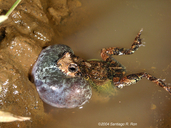|
Distribution and Habitat
Country distribution from AmphibiaWeb's database: Ecuador, Peru
Comments
This species was featured in News of the Week 4 April 2022:
The evolutionary transition to terrestriality and terrestrial breeding in amphibians has occurred repeatedly, but have the required key adaptations, e.g., resistance to desiccation and toxic ammonia build-up, likewise been repeated? Méndez-Narváez and Warkentin (2022) examined this question in a comparative study of four frog lineages, contrasting either short (Agalychnis callidryas, Engystomops pustulosus) or long (Hyalinobatrachium fleischmanni, Leptodactylus fragilis) larval exposure to desiccating conditions. They carried out experiments in an open lab in the rainforests of Gamboa, Panama (Smithsonian Tropical Research Institution). By manipulating environmental conditions (wet vs. dry) and tracking levels of ammonia and urea excretion, they evaluated the tolerance to ammonia exhibited by larvae of each species. They found the two species (H. fleischmanni, L. fragilis) which experience the highest risk of desiccation showed clear evidence for urea production and for pronounced increases in urea excretion, whereas the other two did not. Without urea excretion, the larvae of the high-risk species could experience lethal conditions, providing a clear case for the adaptive value of urea production in these species. They also compared the two foam-nesting species (E. pustulosus, L. fragilis) and two leaf-breeding species (H. fleischmanni, A. callidryas), demonstrating the similar changes in nitrogen metabolism in response to desiccation risk in both comparisons. Their study provides important evidence for the potentially key role of adaptive plasticity in mediating major evolutionary changes. (by Kyle Summers)
Edited by: Michelle S. Koo (2022-04-03)Species Account Citation: AmphibiaWeb 2022 Engystomops pustulatus: Guayaquil Dwarf Frog <https://amphibiaweb.org/species/3413> University of California, Berkeley, CA, USA. Accessed Apr 21, 2025.
Feedback or comments about this page.
Citation: AmphibiaWeb. 2025. <https://amphibiaweb.org> University of California, Berkeley, CA, USA. Accessed 21 Apr 2025.
AmphibiaWeb's policy on data use.
|
